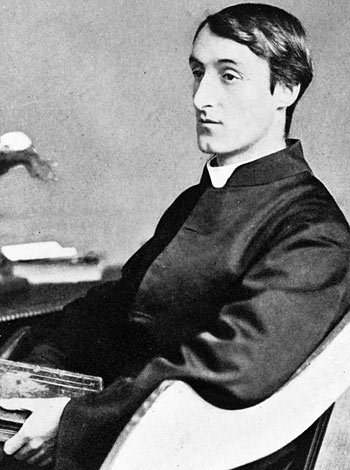“Do you know, a horrible thing has happened to me. I have begun to doubt Tennyson.”
Letter to A.W.M. Baillie (10 September 1864)
Letters, etc
Gerard Manley Hopkins , um padre jesuíta, foi um dos maiores poetas da literatura inglesa.
A sua primeira grande obra foi o poema "O naufrágio do Deutschland" , ao qual seguiram-se poemas líricos como "O francelho", "A calhandra enjaulada"", "O Oxford de Duns Scotus", e "Henry Purcell". Em 1877 escreveu seus trágicos "Sonetos Obscuros", o primeiro dos quais é "Carrion Comfort" . Sua obra completa foi publicada em 1930.
Os impulsos homoeróticos de Hopkins, dirigidos sobretudo a Digby Mackworth Dolben, um colega de Eton, parecem ter tido uma influência decisiva sobre o tom, qualidade e mesmo com o conteúdo da sua poesia. O autor de uma biografia de Hopkins, Robert Bernard Martin afirma que o encontro com Dolben, por ocasião do 17.º aniversãrio de Hopkins, foi provavelmente o momento mais marcante emocionalmente da vida de Hopkins, sobre o qual escreveu abundantemente nos seus diários e a quem dedicou inúmeros poemas, incluindo muitos de caracter elegíaco, considerados dos melhores de Hopkins, após a morte por afogamento de Dolben em 1867.
== Referências ==
Wikipedia

“Do you know, a horrible thing has happened to me. I have begun to doubt Tennyson.”
Letter to A.W.M. Baillie (10 September 1864)
Letters, etc
" No Worst, There Is None http://www.bartleby.com/122/41.html", lines 1-2
Wessex Poems and Other Verses (1918)
“A great work by an Englishman is like a great battle won by England. It is an unfading bay tree.”
Letter to Robert Bridges (13 October 1886)
Letters, etc
Comments on the Spiritual Exercises of St. Ignatius Loyola
Letter to Coventry Patmore (4 June 1886)
Letters, etc
"Felix Randal", lines 11-14
Wessex Poems and Other Verses (1918)
“Mine, O thou lord of life, send my roots rain.”
"Thou art indeed just, Lord, if I contend", line 14
Wessex Poems and Other Verses (1918)
“There lives the dearest freshness deep down things.”
"God's Grandeur," line 10
Wessex Poems and Other Verses (1918)
"On the Origin of Beauty: A Platonic Dialogue"
Letters, etc
“Natural heart’s ivy, Patience masks
Our ruins of wrecked past purpose.”
" Patience, hard thing! the hard thing but to pray http://www.bartleby.com/122/46.html", lines 6-7
Wessex Poems and Other Verses (1918)
"No Worst, There Is None", lines 9 -15
Wessex Poems and Other Verses (1918)
“On this day by God's grace I resolved to give up all beauty until I had His leave for it.”
Journal entry (6 November 1865), as reported in In Extremity: A Study of Gerard Manley Hopkins (1978) by John Robinson, p. 1
" The Blessed Virgin compared to the Air we Breathe http://www.bartleby.com/122/37.html", lines 1-8
Wessex Poems and Other Verses (1918)
" The Leaden Echo and the Golden Echo http://www.bartleby.com/122/36.html: The Leaden Echo, lines 1-2
Wessex Poems and Other Verses (1918)
"Spring and Fall", lines 5-9
Wessex Poems and Other Verses (1918)
Letter to Robert Bridges (3 February 1883)
Letters, etc
" Felix Randal http://www.bartleby.com/122/29.html", lines 1-4
Wessex Poems and Other Verses (1918)
“Beauty … is a relation, and the apprehension of it a comparison.”
"On the Origin of Beauty: A Platonic Dialogue"
Letters, etc
" That Nature is a Heraclitean Fire and of the Comfort of the Resurrection http://www.bartleby.com/122/48.html", lines 22-24
Wessex Poems and Other Verses (1918)